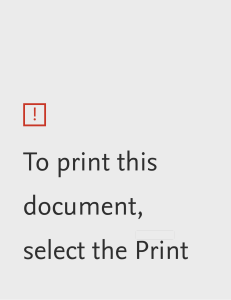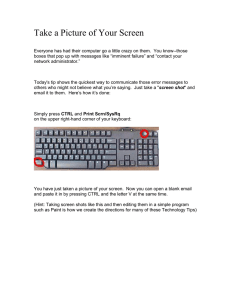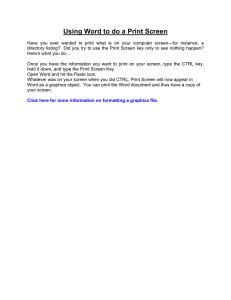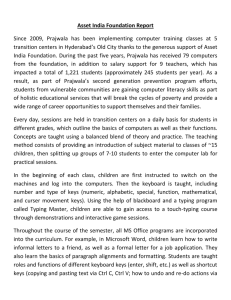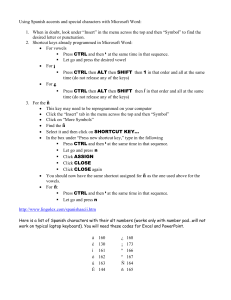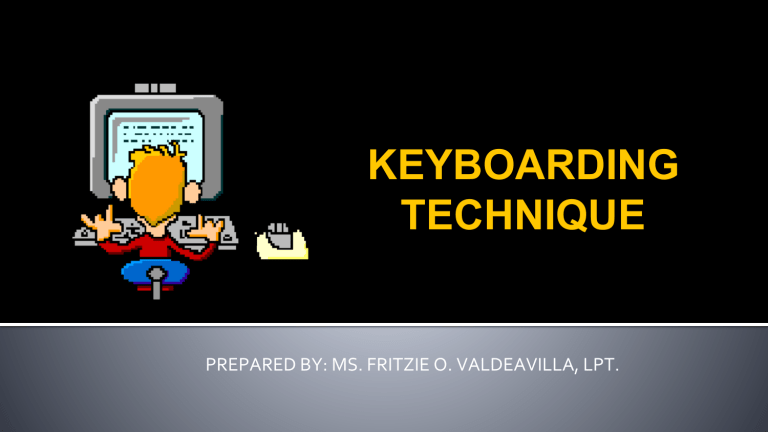
KEYBOARDING TECHNIQUE PREPARED BY: MS. FRITZIE O. VALDEAVILLA, LPT. What component part is use? KEYBOARD A hardware device that functions in accordance to the instructions made by the user. It comprises circuits, switches and processors that help in transferring keystroke messages to the computer. Keyboard skill ◼is known as Keyboarding. Keyboard connector ◼ Keyboards are generally plugged into the rear of the CPU, on the motherboard, using a purple PS/2 connector, or on USB port What is KEYBOARDING? • The ability to enter text by using the correct fingers without looking at the keys (also known as touch typing). What is KEYBOARDING? • Having adequate keyboarding skills to enable you to use the computer more effectively and be more productive Most keyboards have keys arranged in five groups: Typing keys 2. Number keys 3. Function keys 4. Navigation keys 5. Numeric keypad 1. PARTS OF KEYBOARD Tab Key ◼ Moves the cursor/ insertion point to a preset position. ◼ Used to indent paragraphs or to type columns Arrow Keys ◼ Move the cursor/insertion point in the direction indicated by the arrow on each key. Backspace Key ◼ Removes (erases) the character to the left of the insertion point. ◼ Use the right little finger to operate the key Caps Lock Key ◼ Used for keying a string of (three or more) all capital letters. ◼ Capitalizes all letters when used. ◼ If caps lock mode is in use and a letter is keyed while holding down a shift key, a lowercase letter will be keyed. Function Keys ◼ Special keys located at the top of the keyboard (F1, F2, F3, F4, etc.) that are used alone or with the CTRL, ALT, and Shift keys to execute software commands Control Key ◼ Also called CTRL ◼ Executes commands with other key(s) Delete Key ◼ Removes (erases) the character to the right of the cursor/insertion point Proper keyboarding technique Proper keyboarding technique includes: 1. Posture ◼ Spine straight leaning slightly forward ◼ Centered in front of keyboard ◼ Comfortable distance from keyboard ◼ Feet on floor, slightly apart ◼ Eyes on the screen Proper keyboarding technique includes: 2. Body Position ◼Keyboard is at the edge of the table ◼Body should be hand span away from computer. ◼Body is centered with the B and N keys Proper keyboarding technique includes: 3. Feet on the Floor ◼Feet are on the floor. ◼Feet are slightly apart. ◼Always feel balanced. Proper keyboarding technique includes: 4. Curved Fingers ◼ Fingers are comfortably curved. ◼ Fingers are upright and not leaning. ◼ Thumbs are resting on the space bar. ◼ Hands look like “monkey fingers” Important Shortcut Keys CTRL + A = SELECT ALL CTRL + C = COPY CTRL + X = CUT CTRL + V = PASTE Important Shortcut Keys CTRL + Z = UNDO CTRL + Y = REDO CTRL + S = SAVE CTRL + B = BOLD Important Shortcut Keys CTRL + I = ITALIC CTRL + N = OPEN NEW BLANK DOCUMENT CTRL + F = OPEN FIND BOX CTRL + U = UNDERLINE Important Shortcut Keys CTRL + ESC = OPEN START MENU CTRL + ALT + DEL = OPEN TASK MANAGER, REBOOTS THE COMPUTET CTRL + HOME = CTRL + TAB = TO THE TOP MOVE THROUGH PROPERTY TABS Important Shortcut Keys CTRL + END = TO THE BOTTOM CTRL + SHIFT + > = SELECT WORDS CTRL + HOME = TO THE TOP CTRL + TAB = MOVE THROUGH PROPERTY TABS
